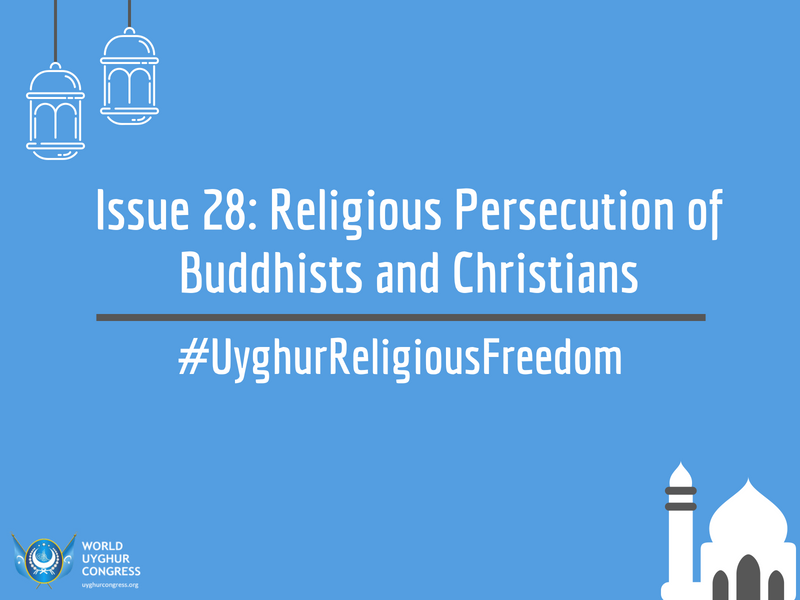Issue 28: Religious Persecution of Buddhists and Christians

World Uyghur Congress, 12 June 2018
 Uyghur Muslims, Tibetan Buddhists and Christians in China have all been subjected to religious persecution and denied their basic religious rights by the Chinese government. In an effort to prevent their from being any authority higher than that of the CCP, the Chinese government has sought to establish complete control over religious practice in China and promote, above all else, loyalty to the state.
Uyghur Muslims, Tibetan Buddhists and Christians in China have all been subjected to religious persecution and denied their basic religious rights by the Chinese government. In an effort to prevent their from being any authority higher than that of the CCP, the Chinese government has sought to establish complete control over religious practice in China and promote, above all else, loyalty to the state.
The parallels in religious repression are unmistakable. Similar to the ban on unauthorised versions of the Quran and on transmitting religious messages digitally, digital copies of the Bible have also been banned by the Chinese government. Both Tibetan and Buddhists have also seen the Chinese government take direct control over its places of worship, as has been done to mosques in East Turkistan. In Tibet, the Chinese government directly controls Buddhist monasteries through ‘management committees’ and they are forced to fly Chinese flags. Over 6,00o monasteries were reportedly destroyed by Chinese police, as also occurred with Uyghur Muslim mosques. Tibetans are carefully monitored and searched at the monasteries for any signs of loyalty to the Dalai Lama. Christians are also only permitted to worship in state-approved churches where they are heavily monitored and restricted in their access, with hundreds of underground churches being shut down.
Much like the strict controls the Chinese government has put on Uyghur Muslims undertaking the Hajj, pilgrimages to sacred Buddhist sites are strictly controlled and it has become near impossible for Tibetans to attend religious teachings outside China. Buddhists and some Christians have also been the target of ‘re-education’ efforts by the Chinese state.
Arbitrary detentions, enforced disappearances and deaths of religious leaders is also common. Prominent Christians are also being arrested and dying in mysterious circumstances, as was the case with Li Baiguang. In 1995, the Panchen Lama, one of the most important figures in Tibetan Buddhism, was subjected to enforced disappearance by the Chinese government when he was just 6 years old.
It is important that we recognise the common struggle for the right to peacefully practice religion that Muslims, Buddhists and Christians in China all face. The Chinese government has sought to sew division and distrust between people of different religions and ethnic backgrounds in order to keep them weak and distracted. It is important that all those facing religious persecution come together to loudly call for religious freedom for all people.

